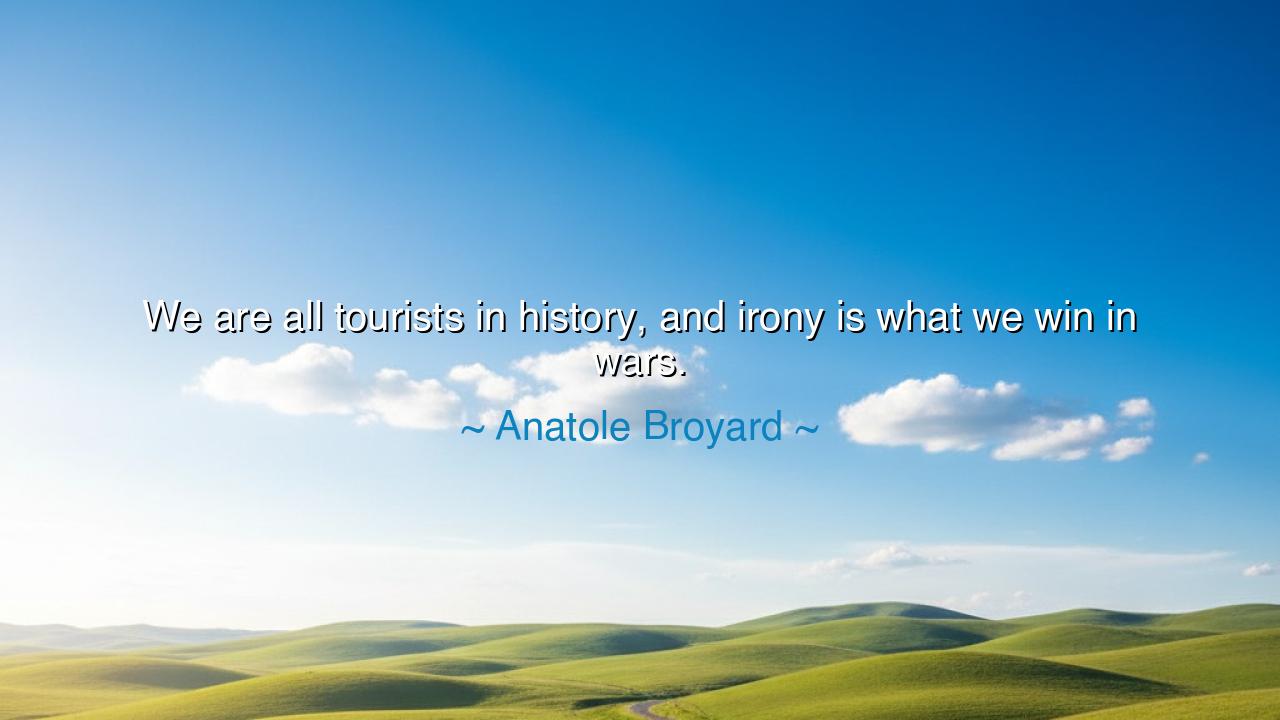
We are all tourists in history, and irony is what we win in






Anatole Broyard once uttered words that cut through the veil of triumph and tragedy alike: “We are all tourists in history, and irony is what we win in wars.” This is no ordinary reflection, but a meditation on the fragile and fleeting place of humankind in the vast scroll of time. To call us tourists is to remind us that we pass briefly through the grandeur and ruins of ages, marveling at them, suffering through them, or sometimes building them, yet never remaining. History endures; we only visit.
The deeper sting of Broyard’s saying is in the second truth: that in wars, the only true prize is irony. Armies march to claim land, nations fight to claim destiny, rulers promise glory. Yet when the smoke clears, what remains is the bitter contradiction that no one truly wins. The conqueror is often left exhausted, the vanquished often becomes the seed of future rebellion, and the graves on both sides speak louder than any anthem. The irony is that while men enter war in the name of permanence, what they gain is only impermanence, futility, and the sorrowful humor of history repeating itself.
We see this truth in the First World War, called at the time “the war to end all wars.” Millions perished, empires crumbled, and the world was reshaped with new borders and fragile treaties. And yet, scarcely two decades later, the Second World War erupted, far bloodier and more devastating. Here lies the irony Broyard names: mankind claimed to have fought for peace, yet prepared the ground for a greater conflagration. Those who lived through it became mere tourists, carried along by events larger than themselves, walking through ruins that mocked the hopes once proclaimed.
The ruins of Berlin in 1945 embodied this irony. The Nazi regime that had promised a “thousand-year Reich” lay in ashes after just twelve years. Citizens wandered through the rubble of their capital, dazed, hungry, and defeated, realizing that the promise of eternal greatness had collapsed into dust and despair. And yet, in that same rubble, the victors too discovered that their triumph came with heavy costs: the Soviet Union drained by tens of millions of dead, Britain bankrupt and its empire dissolving, America burdened with the shadow of the atomic bomb. Who, then, were the winners? None, except irony itself.
Broyard’s wisdom also stretches beyond battlefields into our everyday lives. We, too, are tourists in history, thinking our actions permanent, yet quickly overtaken by new events. Nations rise and fall, cities flourish and decay, families prosper and then fade into memory. The irony of life is that we labor for permanence, but find only transience. Like travelers, we pass through, leaving behind footprints that time soon washes away. Yet this should not bring despair, but humility, and a renewed urgency to make our short passage meaningful.
The lesson is this: do not be deceived by the illusions of conquest, nor by the arrogance of permanence. Recognize that life’s victories are often fleeting, and its ironies often enduring. To live wisely is to walk through history not as a conqueror, but as a mindful tourist — to marvel, to learn, to contribute, but also to accept that we do not own the ages. What matters is not how loudly we claim victory, but how deeply we leave behind seeds of compassion, justice, and peace.
Therefore, beloved, in your own life seek not triumph that fades into irony, but deeds that endure in spirit. Live as one who knows he is passing through, yet honors the journey. Resist the lure of false glory, and instead build works of kindness, of truth, of reconciliation. For though we are all tourists in history, we need not be captives of irony. We can choose to make our brief visit a blessing for those who come after us, so that when the page turns, our legacy will not be laughter at folly, but gratitude for wisdom.






AAdministratorAdministrator
Welcome, honored guests. Please leave a comment, we will respond soon